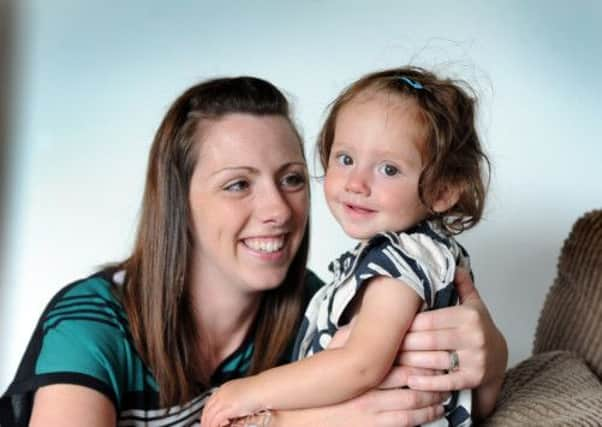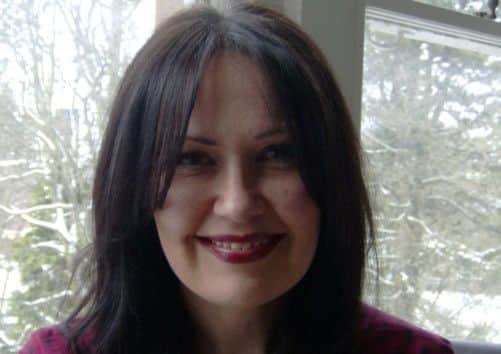Giving birth to the latest booming business


The current baby boom has given birth to a whole new generation of private birth preparation businesses.
The squeeze on NHS courses has meant many are over-crowded or even full, leaving some expectant mums with no choice but to pay for their own birth education classes. Now private enterprises are stepping in to deliver antenatal classes in church halls, dance studios and fitness centres across the region. A report by the Royal College of Midwives in 2011 found that nearly half of new mothers surveyed did not attend NHS classes.
Advertisement
Hide AdAdvertisement
Hide AdThe research, carried out in conjunction with parenting website, Netmums, also found that almost three-quarters of expectant mothers in poverty are not attending antenatal classes at all. The survey of 1,391 mothers revealed that of the mums-to-be with household incomes of less than £15,000, nearly half (44 per cent) had not been offered access to antenatal classes. A further 29 per cent had not attended the classes they were offered.


Netmums’ Cathy Ranson says: “Yorkshire mums-to-be are going private as are others around the UK, but many families are not in a position to do that meaning they miss out on valuable information and feel less prepared and are ultimately more at risk of complications.”
Gill Adgie, of the Royal College of Midwives (RCM) said the financial squeeze had meant NHS trusts were forced to look at staffing and resources and to assess where cuts could be made.
“I think parent education and birth preparation classes have been something that maybe hasn’t had as much resource pumped into, despite the evidence that shows that someone being well-prepared for birth will hopefully get a better outcome.” She added that the RCM is still calling for more midwives to cope with the high birth rate.
Advertisement
Hide AdAdvertisement
Hide Ad“If trusts want to put on antenatal classes these days they are so heavily over-subscribed, classes are in rooms full of 30 parents and although they will deliver something, they may not necessarily be the best way of doing it.”
This has all led to a boom in private birth education classes. The number of parents attending paid-for antenatal classes run by the National Childbirth Trust, the country’s largest provider, jumped from 25,000 in 2005-06 to 40,000 in 2010-2011. And more birth education companies are popping up.
Midwife Lesley Gilchrist, who appeared on Channel 4’s One Born Every Minute, has just opened Bespoke Birthing in Harrogate.
“Many antenatal classes in Leeds are over-subscribed and over-crowded. People will always want to pay for a better service.”She offers antenatal classes at Academy Health Club in Harrogate, along with active birth classes and breastfeeding workshops. Five antenatal classes which last for two and a half hours cost £125 per couple. The mum of two says she was inspired to set up her business after encountering women on the labour ward at Leeds General Infirmary who didn’t know what to expect.
Advertisement
Hide AdAdvertisement
Hide Ad“While working as a midwife I basically found many couples coming into the labour suite unprepared for what lay ahead. I decided to write a book, The Essential Birthing Book and then decided to share this knowledge through Bespoke Birthing to help couples prepare for a good birth.”
Being unprepared can lead to a more traumatic birth. According to the Birth Trauma Association, around 10,000 women a year develop post-traumatic stress disorder. A further 200,000 more women may feel traumatised by childbirth and develop some of the symptoms of PTSD.
RCM Yorkshire representative Gill Adgie says: “If women are potentially better prepared, feel supported and have a nice normal birth that keeps the costs down. It’s the interventions that are costly, the caesarean sections; doctors getting involved and longer stays in hospital.”
A Norwegian study last year reported that women with a fear of childbirth on average spent an hour and half longer in labour. Meanwhile pregnancy and birth phobia are increasing. The RCM claims that tokophobia affects as many as one in ten.
Advertisement
Hide AdAdvertisement
Hide AdMany birth preparation classes in Yorkshire are designed to offer a more holistic and natural approach – and include hypno-birthing, mind and body birth preparation and antenatal classes for dads.
Lucy Hill, from Baildon sought private classes when she was pregnant with her second child.
“I paid for Lazy Daisy classes last year because there was nothing for a second time mum who was suffering from anxiety. I actually had more anxiety with my second one than I did with my first, even though I’d had a lovely birth with my first child.”
Lucy, 31, had SPD (symphysis pubis dysfunction) a condition that causes pain around the pelvis. She was also struggling to bond with her new baby and was bordering on antenatal depression, which doctors wanted to treat with anti-depressants.
Advertisement
Hide AdAdvertisement
Hide AdBy chance she came across a leaflet for Daisy Birthing classes and decided to give them a go. She said she was so bowled over by them that she signed up to become a Daisy Birthing teacher after just three lessons.
“Not only are they giving you education, you are also doing yoga-based moves which help alleviate common pregnancy complaints and help to prepare you for birth.
“Then there is also the relaxation element, affirmations and a bit of bonding with your baby and for me it was that bit that grabbed me because that’s something that you wouldn’t get with an NHS or NCT class. It’s more of a holistic approach.”
She decided to set up her own business in Halifax called Bumps and Beginnings which includes Lazy Daisy birthing classes, bump bonding workshops and a one-stop shop to rent out equipment such as Tens machines and birthing balls.
Advertisement
Hide AdAdvertisement
Hide Ad“The idea is that we are not there to replace traditional antenatal care,” says Lucy. “We are a peer supportive service but we give active birth and antenatal education. What we don’t do and what the NHS and the NCT would do, is discuss medical intervention.
“A lot of mums these days go into birth with very negative expectations and we’re trying to put that positive spin on it and to say your body is designed to birth naturally and these are the things you can do to help it.”
Social enterprise forced to close
A social enterprise in Hull which offered free antenatal classes is closing.
Birth and Beyond ran antenatal classes and a health café to encourage women to breast-feed in west Hull.
Advertisement
Hide AdAdvertisement
Hide AdHowever, the enterprise recently found out that it had lost the contract to run NHS antenatal classes.
The enterprise had run free birth education classes for several years and opened a community cafe in 2011.
Director of Birth and Beyond, midwife Julie Flint, said: “We increased attendance of antenatal classes in Hull by 800 per cent.
“The whole model of bringing health to the high street is what we wanted to do.”
Advertisement
Hide AdAdvertisement
Hide AdShe said the not-for-profit social enterprise could no longer afford to run the café, but will continue classes until next month.
Plenty of information about private services is available online, including:
www.bumpsandbeginnings.co.uk
www.bespokebirthing.co.uk.
www.nct.org.uk